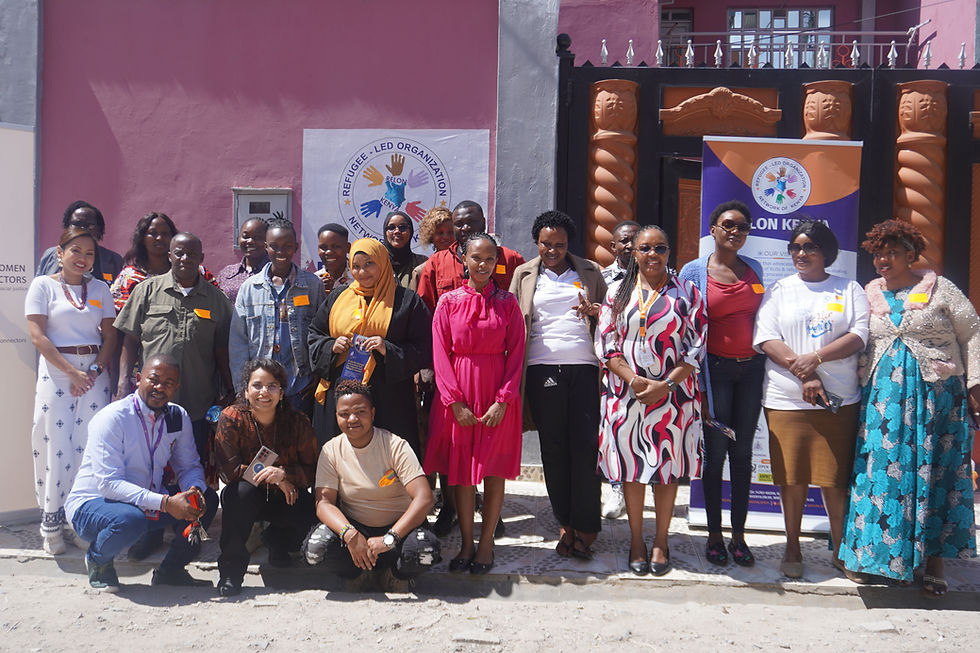New Women Connectors at the Oslo Freedom Forum
- Communication NWC
- Sep 4, 2023
- 3 min read
On 13-15th June our founder Anila Noor and project manager Seyran Khalili participated in the Oslo Freedom Forum. Together with human rights and pro-democracy activists from around the world, they gathered to discuss important topics such as freedom of speech, advocacy and democracy.
“Attending the Oslo Freedom Forum provides a safe space to connect with Human Rights Activists from across the world to build synergies and to ignite the truth. Many of the activists and freedom fighters pay a high price for freedom of expression and human rights we take for granted. Over the years, OFF has evolved from an annual human rights event into a thriving international community celebrating real-life heroes who tell their stories of courage, struggle, perseverance, and resilience in the face of tyranny.” - Seyran Khalili

During her stay in Oslo, New Women Connectors founder Anila Noor gave an interview to the multicultural newspaper Utrop, that was the first norwegian online newspaper for minorities when it was established in 2001. You can read the full article here. But for those who don’t read norwegian, here’s a summary of what Anila shared with Utrop, from her perspective of women with refugee background, head of New Women Connectors, and member of an expert group on migration at the European Commission:
Dutch asylum and immigration policies
Among other things, Anila mentions the Dutch asylum and immigration policies, which “have become more complex in the wake of the war in Ukraine (...) because it has shown a differential treatment of war refugees.” Indeed, in 2022, Dutch politicians have been criticized by migration experts and organizations for the conditions in the refugee camp of Ter Apel.
“Ter Apel has been overcrowded. People are sleeping on the streets because there is no space. Local residents have demonstrated against the camp. At the same time, Ukrainians have been given private accommodation through special legislation.”
“We believe that everyone who flees should receive the same treatment. We should focus on human lives, first and foremost.” - Anila Noor
“People are still struggling to speed up their asylum process. (..) The big cities of Amsterdam, The Hague and Utrecht are managing to handle the newcomers, while smaller places are struggling more to get people settled, due to the housing crisis in the country. The implementation of the policy is not good enough.”
Facing additional challenges as a woman
As a woman and leader of a feminist organization, Anila is also very aware of the additional challenges that exist for immigrant women.
“For immigrant women, language is the main challenge. A large proportion arrive without any level of education and struggle to learn the language. When you struggle to learn the language, you can't get a job in a skills-focused labor market like the Dutch one. In addition, the women have to fight perceptions in society that they would rather stay at home and look after the family.”
As our report showed, migrant women face many difficulties in professional and social integration, partly because of unconscious biases built on stereotypes, which adds on to the other challenges they face during their adaptation in a new legal and social system. The access to jobs for migrant women was already very hard before the pandemic, and it has gotten worse since then.
Europeans need to rethink their integration policies. And meaningfully include migrants and refugees in the process.
Anila insists on the need to be critical of the way European societies define integration today: “We need more reflection on what kind of opportunities we give people. We need to look at how language can become less of a barrier. About why I, as an immigrant woman, am more accepted when I speak Dutch than someone who doesn't speak the language.”
One country Europeans could take example of when it comes to integration policies, is Canada, as Anila explains:
“Canada has a much more open immigration and integration policy. They also have a much more open discussion, where newcomers are allowed to influence the debate to a greater extent (...) In Canada, immigrants are newcomers who are valued, who are given a space to shape their own integration process, and who can grow as people and contribute to a shared society” - Anila Noor
At New Women Connectors, we believe and work towards a meaningful participation of migrants and refugees in policy making, in order to shape the society we want to live in.
Thank you to Claudio Castello from Utrop for interviewing Anila and helping to spread our message. Read the full article in Norwegian below or by clicking here.





_edited.png)


Comments